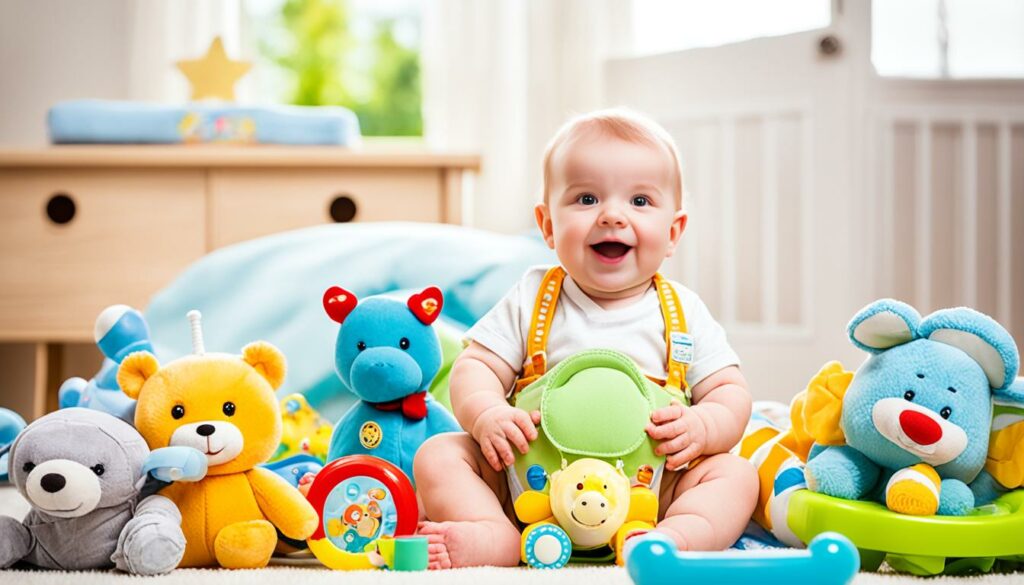Understanding Why Teens Wear Diapers Today
Teenagers wearing diapers has become a topic of interest among parents in recent times. It is crucial to approach this subject with empathy and support. While the idea may seem unusual, it is essential to create a safe space for open dialogue with your teenager.
At times, parents may feel confused or worried about their teenager’s diaper use. It is important to remember that every individual’s experiences are unique, and there can be various reasons behind this choice. By understanding and addressing the underlying factors, parents can navigate this situation with compassion and support.
Key Takeaways
- Teenagers wearing diapers is a complex issue that requires understanding and support.
- Creating a safe space for open dialogue with your teenager is crucial.
- There can be various reasons for teenage diaper use, including medical conditions, psychological factors, or sexual fetishes.
- Address the issue with love and empathy, avoiding judgment or attempts to win arguments.
- Seeking guidance from mental health professionals can be beneficial for navigating this situation.
Addressing the Issue with Love and Support

When it comes to talking to teens about diaper use, it’s essential to approach the conversation with love and support. This means speaking from the heart and creating a safe space for open dialogue. Avoid judgment or attempts to “win” the argument, as this can lead to strained communication and further distance.
Remember, understanding your teen’s perspective is key in addressing their diaper use. By showing empathy and genuinely listening, you can foster a sense of trust and encourage them to share their reasons for wearing diapers.
“It’s crucial for parents to approach this sensitive topic with empathy and love. When we speak from the heart, we create an environment where our teens feel heard and understood.” – Dr. Emily Thompson, Child Psychologist
Create a Safe Space for Dialogue
Building a safe space for dialogue means creating an environment where your teen feels comfortable expressing their feelings and concerns. Here are some tips to facilitate open and honest communication:
- Choose the right moment: Find a time when both you and your teen are relaxed and free from distractions.
- Listen actively: Give your undivided attention and listen without interrupting. Show genuine interest in their perspective.
- Avoid judgment: It’s important not to dismiss or belittle their reasons for wearing diapers. Remember, their experiences are valid.
- Validate their emotions: Let your teen know that their emotions are acknowledged and understood, even if you may not fully comprehend their choices.
Speaking from the Heart
When discussing teenage diaper use, how you communicate matters. Speaking from the heart can help convey your love and support for your teen while promoting understanding. It involves being honest, compassionate, and non-confrontational in your approach.
| Benefits of Speaking from the Heart | Approaches to Avoid |
|---|---|
|
|
Remember, your goal is to have a meaningful conversation that helps you understand your teen better, rather than winning an argument. When you speak from the heart, you lay the foundation for effective communication and problem-solving.
In the next section, we’ll explore the importance of understanding the teen’s perspective when it comes to diaper use.
Understanding the Teen’s Perspective

When it comes to teenage diaper use, it is essential to approach the topic with empathy and understanding. Putting yourself in the teenager’s shoes can help create a more compassionate and open-minded conversation.
Imagine what the teenager may be experiencing and why they have chosen to wear diapers. It could be helpful to consider factors such as comfort, security, or even medical conditions that they may be dealing with.
“I wear diapers because they provide a sense of security and comfort that I struggle to find in other ways. It’s not about regression but rather finding a way to cope with certain challenges.” – Alex, a teenager who wears diapers
By listening and trying to understand their perspective, you can build a stronger connection with the teenager and promote a more productive conversation. This can also create an environment where they feel safe to share their feelings, concerns, and reasons behind their choice.
Exploring Paraphilic Infantilism

Paraphilic infantilism is a rare sexual fetish characterized by individuals deriving pleasure from being treated like infants. Although not classified as a mental illness, understanding this fetish is crucial to better comprehend any potential connections to teenage diaper use.
Role-playing as an infant and engaging in age regression activities can encompass various aspects, such as wearing diapers, using baby bottles, and being cared for by a partner or caregiver. This fetish often involves fantasies of dependency and infant-like innocence, providing a sense of comfort and emotional release for those who engage in it.
It’s important to note that paraphilic infantilism is consensual and should always involve adult participants. It emphasizes the role-play aspect and does not involve the actual desire for underage interactions. Consent, communication, and boundaries remain essential in any sexual relationship or exploration.
It’s essential to approach this topic with respect and understanding, acknowledging that individual preferences and expressions of sexuality can differ significantly. While paraphilic infantilism is not commonly reported, exploring its existence allows for a more comprehensive understanding of teenagers who engage in diaper-wearing behavior.
Considering Bedwetting as a Possible Cause

Bedwetting can often be a factor that leads teenagers to wear diapers. While it may seem embarrassing or frustrating, it is essential to approach this topic with sensitivity and understanding. By evaluating the potential underlying causes, such as medical conditions or psychological factors, parents can provide the necessary support and guidance to address the issue effectively.
Bedwetting, medically known as nocturnal enuresis, refers to the involuntary release of urine during sleep. It is more common in children but can persist into adolescence for some individuals. It is important to remember that bedwetting is not the teenager’s fault and should not be treated as such. Instead, it requires open and honest communication to explore potential solutions.
Underlying medical conditions, such as hormonal imbalances or urinary tract infections, can contribute to bedwetting in teenagers. It is advisable to consult a healthcare professional to rule out any physical ailments that may be causing or exacerbating the issue.
In addition to medical conditions, psychological factors can also play a role in bedwetting. Stress, anxiety, and emotional disturbances can contribute to the inability to control bladder function during sleep. By addressing any underlying psychological issues, such as seeking therapy or counseling, teenagers can find the necessary support and coping strategies to manage bedwetting more effectively.
Parents should create a safe and understanding environment for their teenagers to discuss their concerns openly. Encourage them to share their thoughts and feelings regarding bedwetting and any associated distress or embarrassment. This open dialogue is crucial in providing the emotional support needed to navigate this challenging situation.
Benefits of Discussing Bedwetting:
- Reduces stigma and shame associated with bedwetting
- Facilitates understanding and empathy
- Allows for identification of underlying causes
- Encourages seeking appropriate medical and psychological help
“Open and honest communication is key in addressing bedwetting. By discussing the issue with empathy and understanding, parents can help their teenagers feel supported and find effective solutions.” – Dr. Jane Thompson, Child Psychiatrist
Remember, addressing bedwetting requires patience, compassion, and a comprehensive approach that considers both medical and psychological factors. By providing understanding and seeking appropriate support, parents can help their teenagers manage bedwetting and gain confidence in their ability to handle this temporary condition.
Teachers’ Perspectives on Teenagers in Diapers
When it comes to dealing with diaper-wearing students, teachers have expressed valid concerns, particularly with older students who have not transitioned out of diapers. This issue extends beyond the home environment, impacting students’ independence and adding extra responsibilities for teachers.
Teachers play a crucial role in supporting their students’ growth and development. However, when faced with diaper-wearing students, they may encounter challenges related to hygiene, social interactions, and maintaining a classroom atmosphere conducive to learning.
One of the primary concerns for teachers is fostering students’ independence. Diaper use among teenagers can potentially hinder their ability to take care of their own personal needs, diminishing their self-confidence and sense of autonomy. As educators, it is crucial to address this issue sensitively, allowing students to learn, grow, and develop a sense of independence.
Additionally, teachers also need to consider the comfort and well-being of other students in the classroom. Navigating discussions and potential conflicts related to diaper-wearing students requires a delicate balance to ensure a supportive and inclusive learning environment for all students.
Ultimately, teachers play an essential role in advocating for their students’ overall well-being. By approaching the issue of diaper-wearing students with empathy, understanding, and open communication, teachers can help create an environment where all students feel valued and supported.
| Challenges for Teachers | Impact on Students |
|---|---|
| Managing hygiene | Diminished independence |
| Fostering inclusivity | Impact on classroom dynamics |
| Ensuring a supportive environment | Maintaining students’ self-esteem |
Signs of Mental Health Issues
Teenagers wearing diapers may be exhibiting signs of underlying mental health issues, such as depression and anxiety. It is essential for parents to be vigilant and watch for these signs, as early identification and intervention can greatly impact a teenager’s well-being.
Here are some common signs and symptoms to watch for:
- Changes in behavior: Look out for sudden shifts in behaviors, such as increased isolation, withdrawal from social activities, or loss of interest in previously enjoyed hobbies or interests.
- Mood fluctuations: Pay attention to significant changes in mood, including persistent sadness, irritability, anger, or feelings of hopelessness. Teenagers may also display excessive guilt or engage in self-destructive behaviors.
- Alterations in energy levels: Notice if your teenager experiences a consistent lack of energy or motivation. They may appear lethargic, have difficulty concentrating, or show a decline in academic performance.
- Sleep disturbances: Take note of any changes in your teenager’s sleep patterns. They may struggle with insomnia, have difficulty falling asleep or staying asleep, or experience frequent nightmares.
It is important to remember that these signs may not necessarily indicate depression or anxiety, but they can serve as red flags for potential mental health concerns. If you notice any of these signs persisting or worsening over time, it is crucial to seek professional help for a comprehensive evaluation and appropriate support.
Parents play a vital role in supporting their teenagers’ mental health. By recognizing the signs and addressing concerns early on, parents can help their teenagers navigate the challenges they may be facing.
Remember, adolescence can be a challenging period, and it is normal for teenagers to experience ups and downs. However, if you have any concerns about your teenager’s mental health, it is always best to consult with a qualified mental health professional for guidance and support.
Supporting your teenager’s mental health is crucial for their overall well-being and development. Understanding the signs of mental health issues allows parents to intervene early and provide the necessary support and resources to help their teenager thrive.
Navigating the Challenges
Parents faced with the challenge of teenage diaper use may feel overwhelmed and unsure of how to proceed. In these situations, seeking guidance and support is crucial for both the teenager and their family. Consulting with mental health professionals can provide valuable insights, strategies, and a sense of reassurance when addressing this sensitive topic.
When seeking professional help, parents can find guidance from therapists or counselors specializing in adolescent behavior and mental health. These professionals possess the knowledge and experience to navigate the complexities surrounding teenage diaper use, offering a compassionate and objective perspective.
A mental health professional can assist parents in understanding the underlying reasons behind their teenager’s diaper use, whether it relates to psychological, emotional, or physical factors. By delving into the core issues, parents can gain a deeper understanding to better support their child’s well-being.
Furthermore, a mental health professional can help parents and teenagers develop effective communication strategies, enabling open and honest discussions about their experiences and concerns. These conversations can foster trust, empathy, and mutual respect, creating a foundation for the teenager to express their thoughts and feelings without fear of judgment.
“Seeking professional help empowers parents to take proactive steps towards supporting their teenager’s emotional and psychological well-being.”
By consulting with mental health professionals, parents can also receive guidance on managing potential challenges that arise from teenage diaper use. They can develop coping strategies to navigate social situations, such as school, extracurricular activities, or family events, where the issue may pose unique obstacles to the teenager.
It is important to remember that seeking professional help does not signify parental failure or weakness. On the contrary, it is an act of strength and love for their child. Guidance from mental health professionals equips parents with the tools and knowledge necessary to provide optimal support to their teenager, fostering a healthier and more positive environment.
Benefits of Seeking Professional Help
| Benefits | Description |
|---|---|
| Expert Insights | Gain a deeper understanding of the underlying factors contributing to teenage diaper use. |
| Effective Communication | Learn strategies to foster open and honest discussions with your teenager. |
| Develop Coping Strategies | Receive guidance on managing challenges associated with teenage diaper use. |
| Support and Reassurance | Obtain guidance and reassurance during the journey of addressing teenage diaper use. |
In addition to seeking professional help, parents can also benefit from joining support groups or online communities where they can connect with other parents who may be facing similar challenges. These groups provide a safe space to share experiences, exchange advice, and find solace in knowing that they are not alone in their journey.
Above all, remember that navigating the challenges of teenage diaper use requires patience, understanding, and unconditional love. Seek the support of mental health professionals who specialize in adolescent behavior to help guide you and your family towards a positive and supportive resolution.
Conclusion
Understanding teenage diaper use is a multifaceted issue that requires compassion, open-mindedness, and effective communication. By approaching this topic with love and support, parents can create a safe and non-judgmental space for dialogue with their teenagers. It is crucial to remember that wearing diapers is not necessarily an abnormal behavior, but rather a personal choice influenced by various factors.
During conversations about teenage diaper use, parents should strive to listen actively and empathize with their teenagers’ experiences. It is essential to foster understanding by considering potential underlying factors, such as bedwetting or mental health conditions. By recognizing the complex nature of this issue, parents can better navigate challenges and offer appropriate guidance and solutions to their teenagers.
Remember, understanding teenage diaper use is not about finding a quick solution or passing judgment. It is about fostering understanding, empathy, and support for your teenager. By maintaining open lines of communication and seeking professional guidance when necessary, parents can create a safe and nurturing environment where their teenagers feel comfortable discussing their needs, concerns, and reasons for wearing diapers.
FAQ
Why do teenagers wear diapers?
There can be various reasons why teenagers wear diapers. It could be related to bedwetting, medical conditions, mental health issues, or even paraphilic infantilism. It’s important to approach the topic with empathy and understanding to explore the underlying factors.
How should I address the issue of teenage diaper use?
When addressing teenage diaper use, it’s crucial to approach the conversation with love and support. Create a safe space for dialogue where the teen feels comfortable opening up about their reasons for wearing diapers. Speak from the heart and avoid judgment or attempts to “win” the argument.
How can I understand the perspective of a teenager wearing diapers?
Understanding the perspective of a teenager wearing diapers requires empathy. Put yourself in their shoes and try to imagine what they might be experiencing. By actively listening and trying to understand their reasons, you can foster a more productive conversation.
What is paraphilic infantilism and how does it relate to teenage diaper use?
Paraphilic infantilism is a rare sexual fetish where individuals derive pleasure from being treated like infants. While not necessarily a mental illness, understanding this fetish can help in better understanding any potential connection to teenage diaper use.
Can bedwetting be a reason for teenagers wearing diapers?
Yes, bedwetting can be a reason for teenagers wearing diapers. It’s essential to approach the topic with sensitivity and evaluate any potential underlying causes such as medical conditions or psychological factors. Open and honest communication is crucial in addressing the issue of bedwetting.
How do teachers feel about students wearing diapers?
Some teachers have expressed concerns about students wearing diapers, particularly older students who have not transitioned out of diapers. It can affect their independence and create additional responsibilities for teachers, both in the home environment and at school.
What are the signs of mental health issues related to teenage diaper use?
Teenagers wearing diapers may be an indicator of underlying mental health issues such as depression and anxiety. It’s important for parents to be aware of signs and symptoms like changes in behavior, mood, and energy levels. Recognizing these signs can help parents seek appropriate professional help.
How can parents navigate the challenges of teenage diaper use?
Parents faced with the challenge of teenage diaper use should seek guidance and support. This may include consulting with mental health professionals who can provide valuable insights and strategies for addressing the issue effectively and responsibly.
How can I better understand teenage diaper use in conclusion?
Understanding teenage diaper use is a complex issue that requires empathy, open communication, and a willingness to explore potential underlying factors. By approaching the topic with love and support, parents can create a safe space for dialogue and work towards finding appropriate solutions together.







